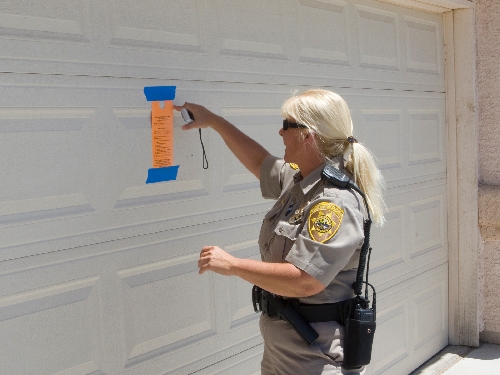Home reseller rails against county code rule
A new Clark County code amendment tramples on private property rights and could throw the entire foreclosure process into chaos, a Las Vegas property owner said.
Nobody with good business sense is going to bid on a foreclosed home that's encumbered by fines of up to $1,000 a day for code violations incurred by the previous owner, said Ed Uehling, who buys and fixes properties for resale.
"I think this law is horrendous, an unmitigated disaster," he said. "It takes away people's rights supposedly established by the Magna Carta centuries ago. This really sets things back. This is a takeover of private property by the government."
Fines on an average $130,000 home could easily exceed its equity in the months it typically takes to complete a foreclosure sale, Uehling noted.
Two ordinances approved by county commissioners in June are "fairly innocuous" and one of them has a $10,000 cap, Uehling said. It's a third ordinance that has no cap and allows the county to impose a nonextinguishable lien on offending properties that he finds "most pernicious" among new fees and fines levied by the county.
The ordinance, which goes into effect today, provides assessment of fines up to $1,000 a day for failure to correct violations of Clark County Code Title 11, the Rehabilitation of Abandoned or Rental Residential Property.
Under the code, rehabilitation of a property includes structural improvements, landscaping and any other measure to improve the appearance of the property or maintain the property in a decent, safe and sanitary condition. It would include, but is not limited to, stagnant swimming pools, overgrown vegetation, graffiti, harboring of vermin, substandard dwellings or public accommodations.
"This allows the government to look at any home with weeds and fine you $1,000 a day," Uehling said. "The homeowner walking away is not going to take care of it. If I sell a property and I take back financing and the buyer doesn't take care of the property, that financing could be wiped out."
The amendment "absolutely" has the ability to derail foreclosure sales, Nevada Bankers Association President and Chief Executive Officer Bill Uffelman said.
Unnecessarily increasing costs related to foreclosure may cause a lender to write off the loan to avoid liability, leaving the property in the hands of an irresponsible mortgager, he said. Similar fines by homeowners associations have already chased away prospective buyers.
"I don't think this is what the county wants to have happen," Uffelman said. "It's a fine line you're walking. It has potential to be a disaster. I think what it's going to take is common-sense application."
Code enforcement officers should go after a house that's partially burned down and overrun by squatters, he said. One of the ordinances seeks to recover funds for draining pools and controlling mosquito infestation.
"Those things -- hey, do it," Uffelman said. "What he (Uehling) is concerned about is they decide his house is a blight on the neighborhood."
Joe Boteilho, Clark County's chief of code enforcement, said officers respond to a variety of complaints from neighbors about a property's condition. It's not an arbitrary decision.
All too often, homes that are abandoned for more than a month create neighborhood blight and drag down values for everyone, he said. Also, renters are usually not concerned with upkeep, so the owner needs to "step up" and take care of those properties, Boteilho said.
"What we have here is the best mechanism on the books to give people due process and get them to rehabilitate properties," he said.
The fine starts at $100 a day for the first 10 days after notification, then goes to $500 a day for the next 20 days and $1,000 a day after 30 days.
Uffelman said banks have every intention of complying with the ordinance, but the problem is they don't own or hold title to the property before foreclosure. The lender or servicer of the loan would be trespassing by entering that property for rehabilitation purposes.
"These things get protracted, so now they've been mailing notices to the home, maybe people are responding, maybe they're not," Uffelman said. "The reality is the water is shut off, the electricity is shut off. Other than securing the place, what can they do?"
It's unreasonable to hold someone responsible for actions that precede a foreclosure sale, Uffelman said. To stack unpaid civil penalties on a property with the expectation that the purchaser at foreclosure will pay them is counterproductive, he said.
A better solution is to let the buyer repair and rehabilitate the property after they have a legal right to do so, rather than raising their costs with penalties over which they had no control, he said.
Boteilho said the county board has the ability to waive the fees and can look at each home on a case-by-case basis.
Uehling said the county, facing its own financial crisis, is imposing fines to augment money it captures from the private sector. That's why he finds the agenda item's stated fiscal impact of "none" to be deceptive. With some 20,000 homes in foreclosure -- many of them abandoned and neglected -- the county could potentially levy fines of $20 million a day.
The ordinance will cause home values to drop even further, Uehling predicted. For the 70 percent of Las Vegas homeowners who are "underwater," owing more than their home is worth, a $1,000-a-day fine might be the final straw that causes them to walk away.
"There are more neglected homes today than there were four years ago because values dropped and people don't have the same amount of upkeep and rehab money," Uehling said. "It's not, as the county believes, because people are more morally degenerate today than they were four years ago."
Contact reporter Hubble Smith at hsmith@reviewjournal.com or 702-383-0491.

















